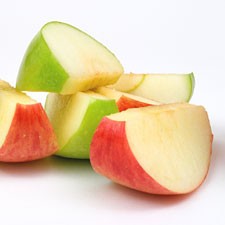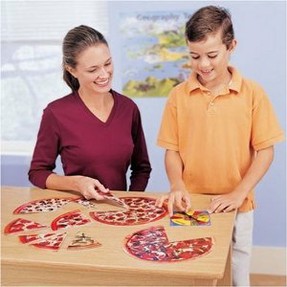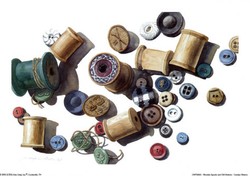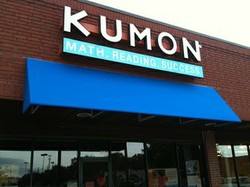 Using experiences that children already understand is a good way to help your child understand fractions better.
Using experiences that children already understand is a good way to help your child understand fractions better.
Children have seen grown ups slice fruit, pizza, cake and pies into smaller pieces lots of times. They are usually very good at noticing if they are getting a smaller slice of cake than their brother or sister too (even if they think they can't do math). This well known experience fits in perfectly with finding out more about fractions.
You can easily cut an apple into halves, quarters and eighths, Cakes or pies can be cut into any fraction size including thirds and sixths. Your child probably knows what a half is when you are cutting up a cake or apple. They just haven't connected what the see on a daily basis with the idea of fractions. If you can help them make this connection you will help their understanding of fractions a lot.
 So make sure your child is with you when you are cutting up a snack, cake or vegetables for dinner. Show them what you are doing. Explain to your child about the fraction concepts that are part of preparing food. But use the food as your focus of the talk rather than more technical math concepts. The more you can connect fractions to everyday life the easier and more interesting fractions will be for your child.
So make sure your child is with you when you are cutting up a snack, cake or vegetables for dinner. Show them what you are doing. Explain to your child about the fraction concepts that are part of preparing food. But use the food as your focus of the talk rather than more technical math concepts. The more you can connect fractions to everyday life the easier and more interesting fractions will be for your child.
There are two problems with using food to teach fractions though. You can't be cutting up food all day. But children usually need to do things lots of times to understand. You also don't want children playing with sharp knives as part of their math learning. There are some good math toys that use this food idea in a way that children can play with again and again. These toys are better than buying books with fraction problems to solve for you child. Wait until they understand the idea of fractions first. If you give them fraction problems to solve too soon you will only make them think math is too hard. Keep your lessons to everyday things at first.


 Using experiences that children already understand is a good way to help your child understand fractions better.
Using experiences that children already understand is a good way to help your child understand fractions better. So make sure your child is with you when you are cutting up a snack, cake or vegetables for dinner. Show them what you are doing. Explain to your child about the fraction concepts that are part of preparing food. But use the food as your focus of the talk rather than more technical math concepts. The more you can connect fractions to everyday life the easier and more interesting fractions will be for your child.
So make sure your child is with you when you are cutting up a snack, cake or vegetables for dinner. Show them what you are doing. Explain to your child about the fraction concepts that are part of preparing food. But use the food as your focus of the talk rather than more technical math concepts. The more you can connect fractions to everyday life the easier and more interesting fractions will be for your child. 

 Children also learn well through play. Luckily there are a few fraction games for kids that use food to help them learn about fractions. Keeping to the same theme (food) helps make fractions easy for your child. Once they have the idea of what fractions are you can start to include other things that aren't food. Then when they can work out fractions in real life with food, toys and other things you can move on to problem solving books.
Children also learn well through play. Luckily there are a few fraction games for kids that use food to help them learn about fractions. Keeping to the same theme (food) helps make fractions easy for your child. Once they have the idea of what fractions are you can start to include other things that aren't food. Then when they can work out fractions in real life with food, toys and other things you can move on to problem solving books. 










 Monkey Birthday Party Favorson 01/24/2013
Monkey Birthday Party Favorson 01/24/2013
 Butterfly Birthday Party Favorson 02/02/2013
Butterfly Birthday Party Favorson 02/02/2013
 Monster High Birthday Party Favorson 01/24/2013
Monster High Birthday Party Favorson 01/24/2013
 Basketball Party Favors for Girlson 01/30/2013
Basketball Party Favors for Girlson 01/30/2013




Comments
I agree Katie. Fractions are such an important math skill for everyday life. As a music teacher fractions came up constantly - and I had so many older students who didn't understand the basic principles of fractions.
Fractions may well be one of the most vital basic math skills over looked. I've worked in the Administrative Business field all my life. While administering basic entry level testing for employment consideration the most commonly under performed portion of the entry test is that of fractions, common fractions seems to be the link many miss in their math education. This is useful and vital math facts.